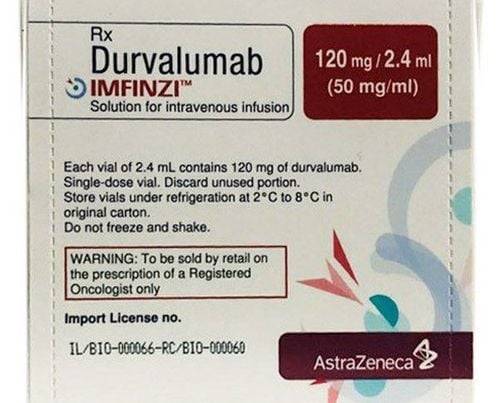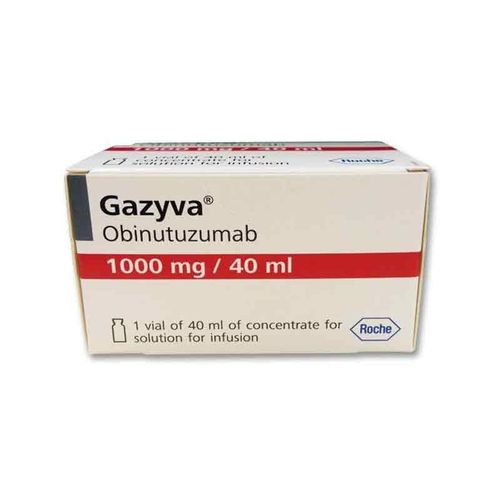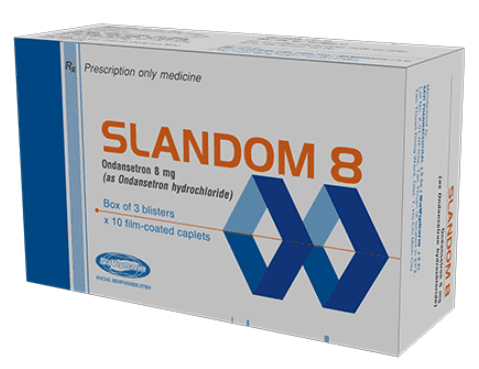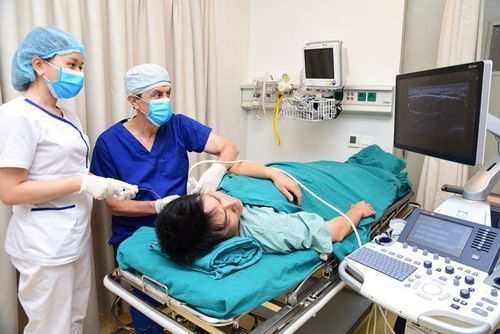This is an automatically translated article.
Mesothelioma is a rare cancer that forms in the lining of the lungs or abdomen, caused by exposure to asbestos fibers. Survival rates for malignant mesothelioma are generally low, and the median life expectancy is about 12-21 months. So what causes mesothelioma? How many types of mesothelioma are there? What are the manifestations of mesothelioma? Find out more information in the article below.
1. What is Mesothelioma?
Primary mesothelioma is a type of mesothelioma that occurs in the protective membrane surrounding all internal organs of the body. The disease most commonly occurs in the lining of the lungs or abdomen. Regardless of their origin, malignant cells from mesothelioma can invade and damage adjacent tissues. Cancer cells can also metastasize or spread to other parts of the body. Most patients with mesothelioma die as a result of respiratory failure or pneumonia.
Some patients have small bowel obstruction when the tumor grows through the diaphragm. A small number die from cardiac complications when the tumor invades the heart and pericardium. Symptoms can include chest pain, shortness of breath, and general fatigue.
2. Symptoms and types of mesothelioma
Symptoms of mesothelioma appear when the tumor spreads, grows, and presses against the chest wall and abdominal cavity. Early diagnosis can help patients live longer.
2.1. Common mesothelioma symptoms Dry cough Shortness of breath Respiratory complications Chest or abdominal pain Fever or night sweats Pleural effusion Fatigue Muscle weakness 2.2. Pleural mesothelioma symptoms The early signs of pleural mesothelioma can resemble other respiratory illnesses such as pneumonia or the flu. When symptoms are identified and treated quickly, patients can benefit from a higher quality of life and improved life expectancy. Symptomatic control is an important part of comprehensive treatment for lung mesothelioma.
2.3. Symptoms of peritoneal mesothelioma Early signs of peritoneal mesothelioma can be mistaken for gastrointestinal conditions such as irritable bowel syndrome or menstrual disorders such as uterine fibroids. Common symptoms of peritoneal mesothelioma, which forms on the soft tissue lining the abdomen, include:
Abdominal pain Abdominal swelling Fluid accumulation in the abdomen (ascites) Unexplained weight loss Nausea and vomiting vomiting Constipation Loss of appetite Doctors may prescribe chemotherapy drugs, such as pemetrexed, cisplatin, carboplatin, and gemcitabine, to shrink peritoneal mesothelioma and help slow its growth. cancer.
2.4. Pericardial Mesothelioma Symptoms Early signs of pericardial mesothelioma can be mistaken for heart disease. Common symptoms of pericardial mesothelioma include:
Shortness of breath (difficulty breathing) Chest pain Shortness of breath Tachycardia or irregular heartbeat (arrhythmia) Heart beat Pericardial mesothelioma The heart develops in the lining around the heart called the pericardium. This is one of the rarest forms of the disease. Symptoms stem from a thickening of the pericardium, which can make it harder for the heart to pump efficiently.
2.5. Testicular Mesothelioma Symptoms Early signs of testicular mesothelioma can be mistaken for trauma or diseases such as epididymitis, which involves inflammation of the testicles. Common symptoms of testicular mesothelioma include:
Hydrocele (fluid in the scrotum) Testicular pain Testicular swelling Tumor in the scrotum A lump in the testicle is the most common sign of mesothelioma testicular tissue - the rarest of all types of mesothelioma. Accounts for less than 1% of all mesothelioma cases.
3. Causes of Mesothelioma
In general, cancer begins when a series of genetic mutations occur in cells that cause cells to grow and multiply, proliferating uncontrollably. It is still uncertain what causes mesothelioma. But researchers have identified factors that may increase the risk.
The interaction between many factors such as: genetics, environment, health conditions and lifestyle.
4. Developmental stages of mesothelioma
Imaging tests that help determine your cancer stage include:
Computed tomography (CT scan) of the chest and abdomen Magnetic resonance imaging (MRI) Positron emission tomography (PET) When the extent pleural mesothelioma is identified, the stages of the cancer are classified as follows:
Stage I – the mesothelioma is considered localized cancer, which means it is confined to a part of the class chest mucosa. Stage II – Mesothelioma may have spread beyond the lining of the chest to the diaphragm or lungs. Stage III – Mesothelioma may have spread to other structures in the chest and may have spread to nearby lymph nodes. Stage IV – Mesothelioma is an advanced cancer that has now spread in the chest. Stage IV can also mean that mesothelioma has spread to distant areas of the body such as the brain, liver, and lymph nodes anywhere in the chest.
5. Treatment methods of mesothelioma
5.1. Surgery To remove mesothelioma when diagnosed at an early stage. In some cases, surgery is effective. Sometimes, surgery can't remove all of the cancer, but in many cases, surgery helps relieve signs and symptoms.
Surgery to remove as much of the cancer as possible. This method helps doctors treat radiation more accurately. It also relieves pain and reduces fluid accumulation caused by mesothelioma.
5.2. Chemotherapy It is the use of chemicals to destroy cancer cells. Systemic chemotherapy goes throughout the body. Effects: shrink or slow the growth of tumors that cannot be removed by surgery.
Chemotherapy may also be used before surgery (adjuvant chemotherapy). That makes it easier to have surgery or chemotherapy after surgery to reduce the risk of the cancer coming back.
5.3. Radiation Therapy is a method of focusing high-energy beams from sources such as gamma and proton beams. Projection focuses on a specific place or point on the body.
Radiation therapy may be used after surgery to kill any remaining cancer cells. It can also help reduce signs and symptoms of advanced cancer in cases where surgery is not possible.
Vinmec International General Hospital is a specialized medical examination address, with many modern services. The hospital has many different specialties with a team of qualified doctors, advanced medical equipment, supporting patients to receive the best examination and treatment. Therefore, when there is a health problem, customers can go to Vinmec for examination and advice and a treatment regimen suitable for each current health problem.
Please dial HOTLINE for more information or register for an appointment HERE. Download MyVinmec app to make appointments faster and to manage your bookings easily.













